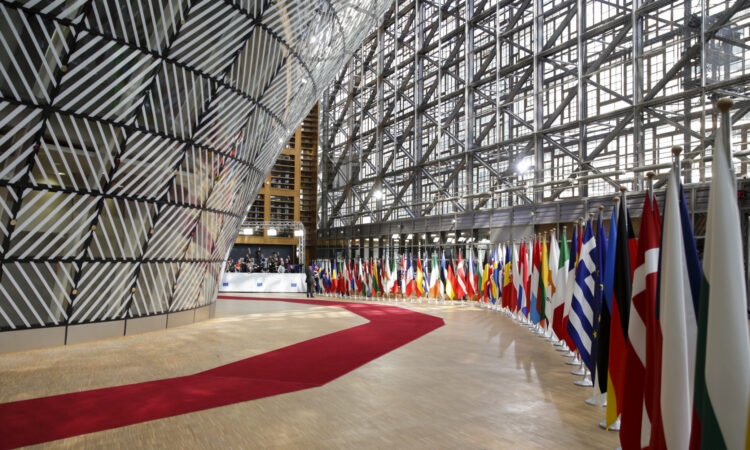
Press conference following the March European Council
Main results
EU leaders discussed the latest developments in relation to Russia’s war of aggression against Ukraine and continued EU support for Ukraine.
The President of Ukraine, Volodymyr Zelenskyy, joined the EU leaders via video conference.
Competitiveness, single market and the economy, energy, external relations and other topics, including migration, were also discussed.
EU response to Russia’s war of aggression against Ukraine
The European Council reiterated its resolute condemnation of Russia’s actions and unwavering support for Ukraine and its people.
EU leaders welcomed a resolution by the UN General Assembly on ‘Principles of the Charter of the United Nations underlying a comprehensive, just and lasting peace in Ukraine’, which was adopted in February and received broad support from the international community. EU leaders reiterated their support for President Zelenskyy’s peace plan.
Accountability of perpetrators
The European Council called for:
- an immediate, complete and unconditional stop to Russia’s aggression
- full respect for international humanitarian law, including the treatment of prisoners of war
- the safe return of Ukrainians deported to Russia, in particular children
EU leaders took note of the arrest warrants issued by the International Criminal Court against Russia’s President and his Commissioner for Children’s Rights for war crimes.
They also welcomed the agreement to create the new international centre in The Hague for the prosecution of the crime of aggression against Ukraine.
The European Union is firmly committed to ensuring full accountability for war crimes and the other most serious crimes committed in connection with Russia’s war of aggression against Ukraine.
European Council conclusions, 23 March 2023
Sanctions against Ukraine
Since the start of Russia’s war, the EU and its member states have made available around €67 billion to Ukraine and its people. They also adopted an unprecedented set of restrictive measures against Russia, which visibly affected its regime and its economy.
The EU remains committed to maintaining and increasing collective pressure on Russia through:
- possible further restrictive measures
- work on the oil price cap with partners
EU leaders underlined the importance of ensuring the effective implementation of restrictive measures and preventing and countering their circumvention.
The European Union will intensify its work with partners to counter false Russian narratives and disinformation.
Military and defence needs
The European Council welcomed the agreement in the Council to urgently provide Ukraine ground-to-ground and artillery ammunition.
Recovery and reconstruction
EU leaders remain committed to supporting, along with partners, Ukraine’s repair, recovery and reconstruction by:
- stepping up work towards the use of Russia’s frozen assets for the reconstruction of Ukraine
- supporting the establishment of an international mechanism to register the damage Russia has inflicted
Moldova
The European Union will continue to provide all relevant support to the Republic of Moldova to strengthen the country’s resilience, security, stability and economy and help it on its path to EU accession.
The European Council invited the Commission to present a support package ahead of its next meeting.
Global food security
The European Council took note of the recent extension of the UN Black Sea Grain Initiative, underlining the substantial EU contribution to efforts to support the export of Ukrainian food through the EU solidarity lanes.
A robust and future-proof economy
The European Union is building a robust and future-proof economy that secures long-term prosperity. This requires a deepening of the single market and reinforcing industrial, agricultural and trade policies.
The EU single market
On the occasion of its 30th anniversary, EU leaders highlighted the benefits of the single market and supported a renewed focus on enforcing rules and removing barriers to cross-border business.
A well-functioning single market remains fundamental for the success of the green and digital transitions, for our future growth and for economic, social and territorial cohesion.
European Council conclusions, 23 March 2023
EU leaders called for ambitious action to:
- complete the single market, in particular for digital and services
- address the vulnerabilities exposed by recent crises
Competitiveness
With the aim of boosting the EU’s long-term competitiveness, the European Council called for work to be taken forward on:
- strengthening the EU’s resilience and productivity
- simplifying rules and procedures and reducing the administrative burden
- allowing for easier access to private capital and investment (in particular for small and medium-sized entreprises) and ensuring targeted support in strategic sectors
- reducing the EU’s strategic dependencies
- encouraging innovation and increasing investment in research and development
- strengthening the digitalisation of the economy, unlocking the value of data, and ensuring the EU stays at the forefront of new and emerging technologies
- investing in the skills of the future
- fostering the transition towards a more circular economy
Industrial policy
EU leaders called for work to be taken forward on the European critical raw materials act and the net-zero industry act and took note of the revised state aid framework.
Trade
The European Council held a strategic discussion on the geopolitical aspects of trade and underlined the contribution of trade policy to the EU’s competitiveness.
Infographic – Council orientations for a reform of the EU economic governance framework
Economic policy coordination
Leaders endorsed Council orientations for a reform of the EU economic governance framework to make it fitter for current challenges. They were adopted on 14 March 2023.
In the framework of the 2023 European Semester, which is the annual cycle of economic, fiscal, labour and social policy coordination within the EU, leaders endorsed the draft Council recommendation on the economic policy of the euro area.
The European Council also endorsed the policy priorities of the annual sustainable growth survey and invited member states to reflect them in their national reform programmes and stability or convergence programmes.
Energy
EU leaders took stock of actions taken at EU level to address high energy prices, reduce gas demand, ensure security of supply and phase out dependency on Russian fossil fuels.
Leaders called on the Commission and the member states to ensure preparedness and contingency planning in view of the next gas storage filling and heating seasons. They urged all stakeholders to make full use of the EU Energy Platform to further improve the security of gas supplies at affordable prices.
The European Council invited the Commission to promptly finalise the assessment of the emergency measures adopted in 2022 and, where necessary, to propose the extension of their application.
Leaders asked the Council and the European Parliament to quickly agree on all relevant proposals to accelerate the green transition, and to take work forward without delay on the proposed revision of the EU’s internal electricity market design with a view to ensuring its adoption by the end of 2023.
EU-UN relations
Leaders also held an exchange of views with António Guterres, United Nations Secretary-General.
They agreed on the importance of EU-UN cooperation to tackle global challenges and stressed their shared commitment to multilateralism.
Migration
The Council presidency and the Commission informed the European Council about progress in the implementation of its February conclusions on migration.
Leaders called for the swift implementation of those conclusions and will review it again in June.
External relations
EU leaders welcomed the:
- outcome of the latest Donors’ Conference in support of people in Türkiye and Syria following the tragic earthquake on 6 February
- agreement on the path to normalisation of relations between Kosovo* and Serbia through EU-facilitated dialogue
- agreement on the Windsor Framework
The European Council also condemned the sentencing of prominent representatives of the Belarusian democratic opposition.
Water security
The European Council welcomed the UN 2023 Water Conference and its Water Action Agenda.
EU leaders acknowledged the need for enhanced EU and global action on water and underlined the importance of a strategic EU approach to water security.
Euro Summit
In the margins of the European Council, a Euro Summit in inclusive format, with all 27 leaders, will be held on 24 March.
*This designation is without prejudice to positions on status, and is in line with UNSCR 1244/1999 and the ICJ Opinion on the Kosovo declaration of independence.







